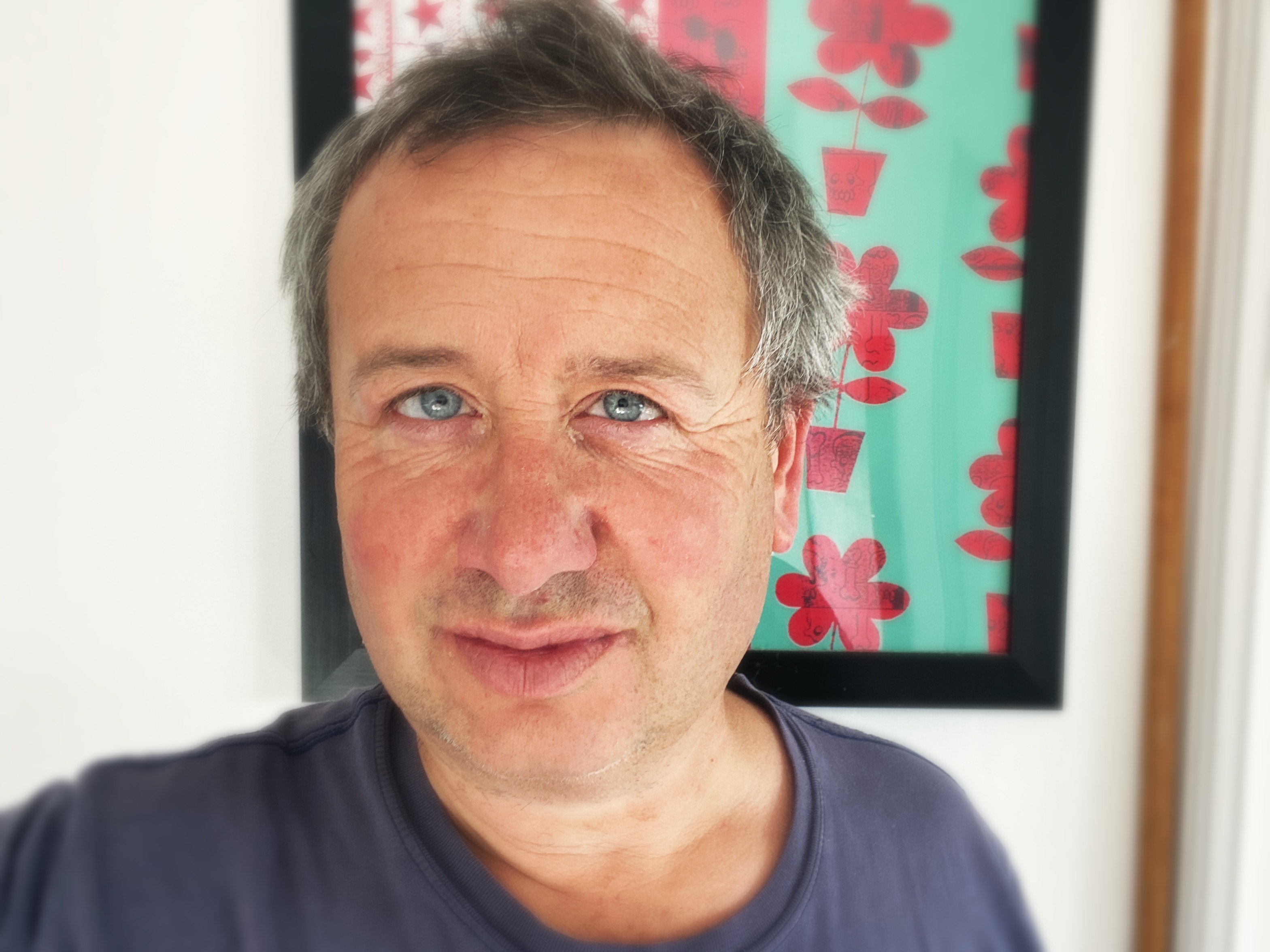Ian Sciacaluga
I’m a UK-based, Producer-Director of TV documentaries, commercials, and charity films. I was born on the tiny isthmus of Gibraltar and I studied at the London International Film School where I graduated with a distinction in Art direction.
I worked as a storyboard artist and as a junior art director on a few television dramas before I became a documentary Director with “Millennium Kids” - a short film about teenagers confronting adulthood on the eve of their sixteenth birthdays. It’s been screened around the world. I’ve since directed over 50 x tv commercials, many for major brands like Dove, Pampers, Kelloggs and British Telecom, some 20 plus episodes of ‘The Lonely Planet’ and ensuing ‘Globetrekker’ travelogue series and 3 x one hour documentaries shown on Netflix, including the recently lauded “Hidden Algeria”.
In 2023, I won Best Short film at the Barcelona Indie awards and Venice Under the Stars International Film Festival for my drama, “Imbroglio” and Best Dance Short for my community project piece, “We Dance for Life”, both at the Prague Music Film awards and The Experimental Dance and Music Film Festival in the USA.
I am currently editing a low budget feature film, ‘HIDE’, which I hope to premiere in the summer of 2024.
Your project has entered in our festival. What is your project about?
“Imbroglio” is a short film noir evoking the Hollywood and European thrillers of the ‘40s and ‘50s. It’s inspired by the works of Directors like Robert Siodmak, John Huston and Jean-Pierre Melville. In keeping with the “noir” genre, I wanted to create a hard-nosed anti-hero and place him in an underworld of malcontents. This is the story of a brutal tax inspector, Giorgio Gambetti, who uses force to subjugate tax evaders and frauds. However, he becomes emasculated after his wife has an affair with a young student and he is forced to cross the underbelly of a city that knows him only too well, in order to catch and unmask his wife’s lover.
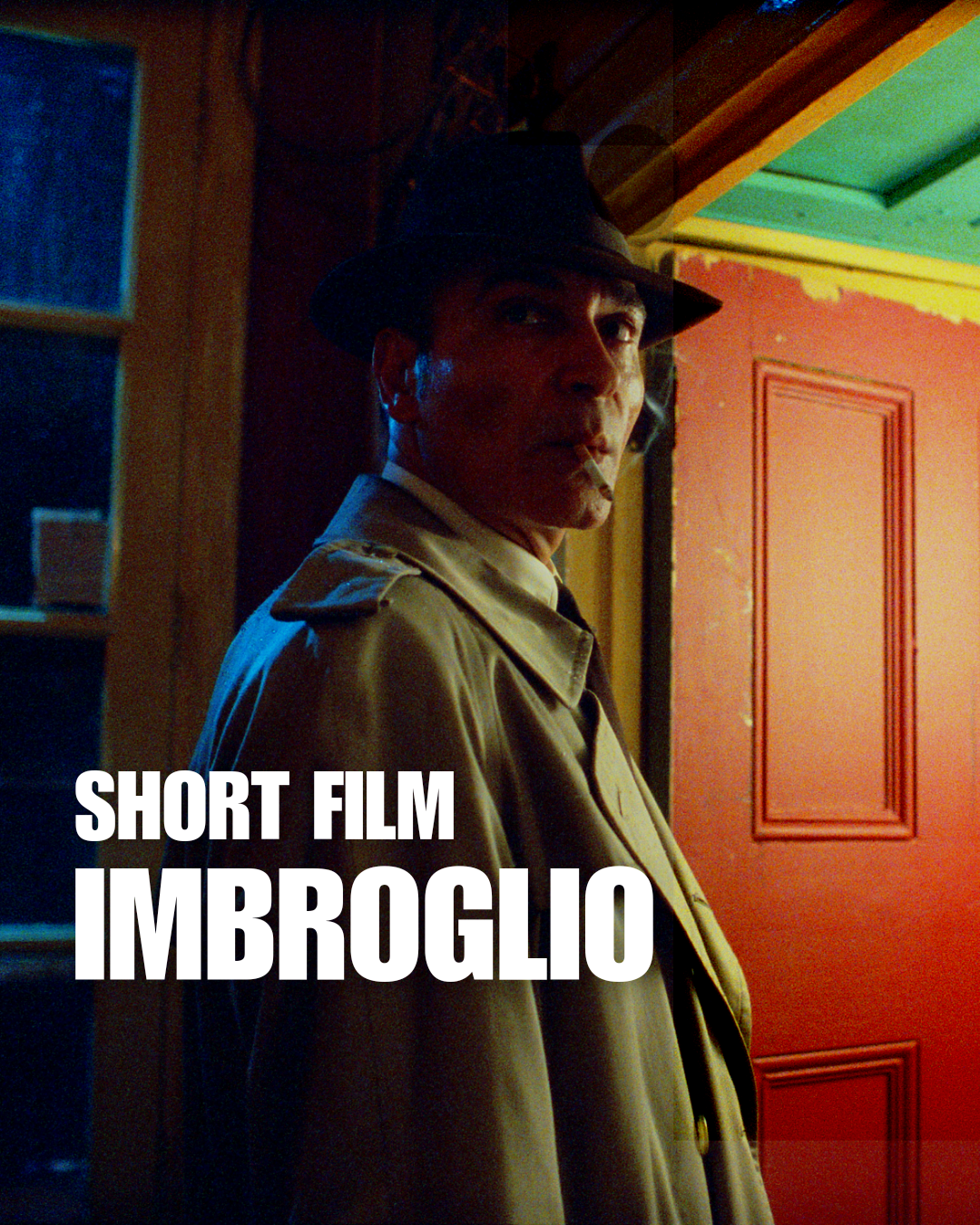
What are your ambitions with your project?
I’d love to screen “Imbroglio” to an audience, yes at festivals, preferably in a cinema and if possible, projected, as I shot it on 35mm film. There is nothing better than audience participation and appreciation of one’s work, especially after the confinements of COVID.
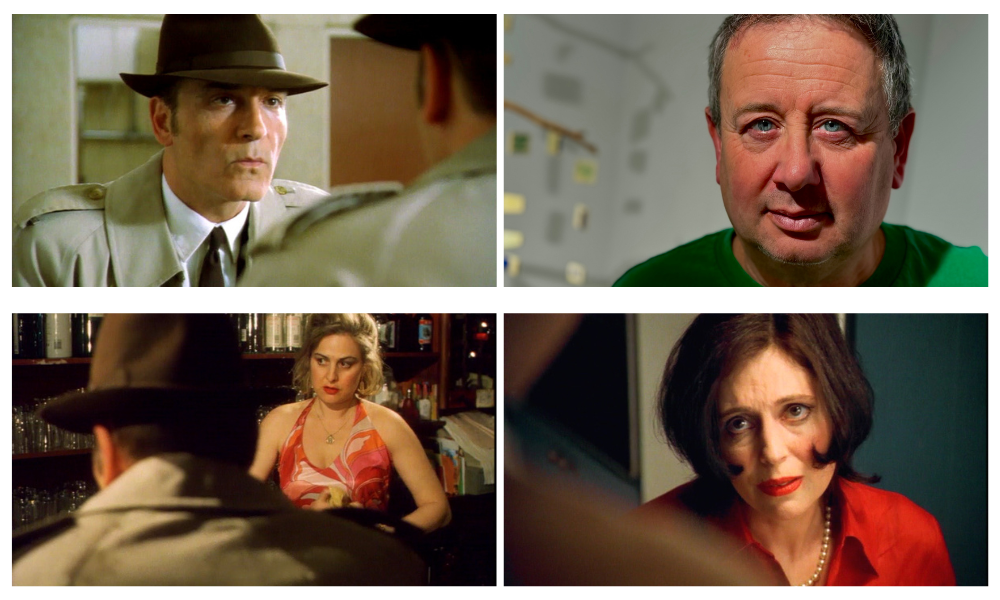
Tell us something about your shooting? What pleasantly surprised you?
Imbroglio was shot on 35mm, from stock which I saved from a tv commercial I once directed (cheeky, I know). It was made in 6 days – 5 of them on locations in London and one day for the exteriors in Rome. It was originally written to be filmed in Italian by a good Director friend of mine but after he was busy on something else, I decided to make it myself, with essentially a UK-based cast, other than the lead, Paolo Maria Scalondro, who I recruited in Rome. I wanted to make something classical and formal, stylised, cinematic and overtly dramatic, as part of my film education. I tried to be rigorous with my choices of camera angles and quite conservative in my framing. I storyboarded the film, not because I felt insecure but because I wanted to stick to the plan of approach. Shooting on film – which is expensive, believe me! – made me quite disciplined in the number of takes I shot. I spent a day of read -throughs and rehearsal prior to filming, as a result.
The most surprising thing about making this film is that I learned how the film noir genre is really pure cinema. It’s unrelenting in its dramatic intentions, almost Shakespearian in its themes of betrayal and flawed heroes and heroines. But at the same time, they are quite simple in their construction. Making this has informed my film-making greatly.
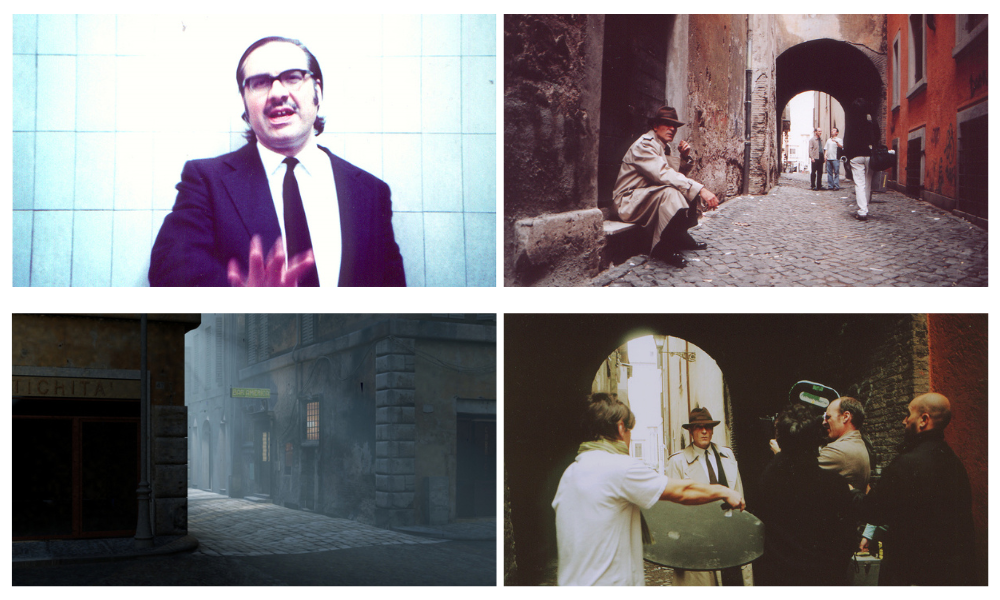
For what group of spectators is your film targeted?
The target audience is for those growing up before the digital age of film-making. But I really would love to reach out to young audiences, especially those who now choose film technique over the dramatic content in their movie -making.
Why should distributors buy your film?
The film noir aesthetic is timeless and attractive to all audiences - young and old; maybe because of its dramatic story lines and grey characters. “Imbroglio” hopefully bears all the hallmarks of a classical thriller. My original film is also mastered on 35mm, which means that digital copies are of very high resolution, making it a movie that is fabulous to screen and watch in a cinema or on the tv screen.
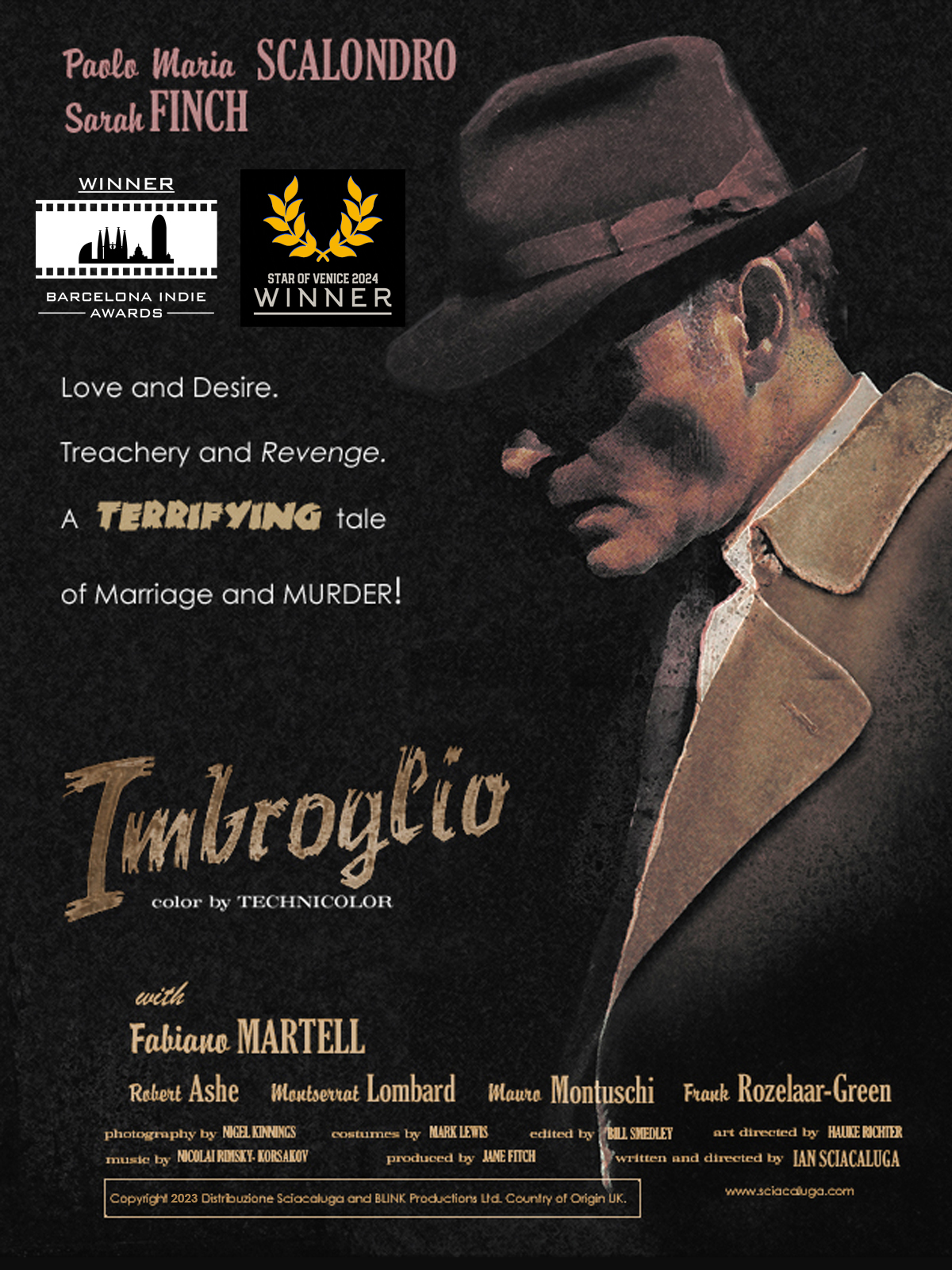
How would you specify your work? What characterizes your film?
Imbroglio is a timeless film noir about unrequited love and revenge. It’s my loving paean to old Hollywood thrillers and the European ones that followed. Angles are dramatically rather than artistically driven - out of my respect for the masters who directed Hollywood thrillers back in the day. The shots are conservatively framed and precise and I have adopted the old 1.33:1 aspect ratio in homage to my favourite movies of that period
Why did you decided to become a filmmaker?
I was 12 when I saw Steven Spielberg’s “Close Encounters of the Third Kind” and it was in a little cinema in Thurrock where I grew up that I witnessed how films can be like beautiful dreams that you don’t have to let go of. The idea of being transported to fascinating places – be it light, dark, comedic or otherworldly - was too big a pull to resist. And it has been 50 odd years of feast and famine, hopes and disappointments, validation and survival ever since!
Who is your role model?
Steven Spielberg, Ironic choice considering Imbroglio has more to do with the likes of Robert Siodmak, Howard Hawks, John Huston, John Ford, Jean-Pierre Melville and even early Stanley Kubrick!
Which movies are your favorites? Why?
I love all kinds of movies. Some have a nostalgic pull from childhood that can’t be suppressed and others are more mature and sophisticated. Thus, my choices are very eclectic. I’ll list my childish/ childhood ones first and then my more serious contenders. Jaws, Close Encounters of The Third Kind and Raiders of the Lost Ark (Spielberg) Star Wars (Lucas) On Her Majesty’s Secret Service (Hunt), Gold Rush (Chaplin) Duck Soup (Marx Brothers/ Sam Wood) Bringing Up Baby and Only Angels have Wings (Hawks) Double Indemnity (Wilder) The Life & Death of Colonel Blimp and A Matter of Life and Death (Powell and Pressburger). Notorious, Vertigo, Rear Window and North by Northwest (Hitchcock), The Searchers and The Man Who Shot Liberty Valance (Ford)
Orphee (Cocteau), The Ladykillers (McKendrick) Smiles of a Summer Night (Bergman) Walkabout (Roeg) Five Easy Pieces (Rafaelson) The Conformist (Bertolucci) Deserto Rossi and Blow Up (Antonioni).
Where do you look for inspiration for your films?
I’m not rooted to a style but I am attracted by themes of human vulnerability and fragility, whether it’s a comedy, a thriller or a drama. I also find ridiculousness in life’s situations and enjoy inserting those moments into my films, even if it’s if only to offset or temper a taut or tense sequence. Maybe that’s because I like films that modulate rhythm and tempo; films that veer on the side of the unpredictable and surprising. Or it could be a sign of my madness!
Which topics interest you the most?
I like how small actions can have a monumental effect on the world. How one ordinary moment can have extraordinary consequences. As an example, one of my first short films was about a boy in 1944, who climbed a tree to eat a stolen cake and he witnesses the first V-1 rocket that was launched by the Nazis on British soil. He gets mistaken for a German pilot by a group of WRVS ladies and causes all sorts of commotion in the villagers, who takes up arms in fearful reprisal.
What do you consider your greatest achievement in your career?
I’ve made some kooky tv commercials that have amused quite a few folk and some documentary films about architecture and modern art I loved writing and producing. These films I made at a breakneck speed with little budget and very tight deadlines. Carrying them out successfully and with my mental health in tact has given me great relief!
What do you consider most important about filming?
I think research in documentaries is a must. And in fiction, the ability to listen to better ideas if they come your way. I.e. the outcome of the film is always more important than the vision that one has. It’s taken me years to learn but it’s instilled in me now. Being able to be objective when you need to be and being able to adapt to the variables that film-making throws at you will make you a more efficient film-maker. And I think this is crucial in this day and age of tighter budgets and bigger expectations.
Which film technique of shooting do you consider the best?
I think genre and story best dictates the film techniques one uses. I am a big fan of working out the rhythm of a movie before I go into production. By that I mean, planning shots to fit the tempo of my scenes and story as a whole. Once you know your rhythm, you can design shots to fit it. Whether it’s a one long take wonder, a series of fast cuts, a complex tracking shot or a majestic drone aerial. I also advise against repeating techniques. For example, I have an issue with battle scenes. Shooting those in the same, visceral way is bloody tedious.
How would you rate/What is your opinion about current filmmaking?
The best thing about making films is that you’re always the pupil. You’re learning and never quite mastering the craft. It makes you insecure at times but it’s also a motivator. I’ve been making films for many years now and I’ll admit I’m confident in designing shots that make some sort
of sense when cobbled together. However, I’m forever learning new ways of expression and bold ways of telling stories. Making daring creative leaps is what distinguishes good film-makers from great ones. It’ll take me a lifetime.. and beyond to get anywhere near there. Buyt hey, it’s the journey that counts.
What can disappoint you in a movie?
A plot that leaves the audience behind through its own self indulgent cleverness. A lack of character development. A relentless addiction to action scenes that turn characters into elastic superheroes who function unrealistically. I call these movement films. One pace narratives. Seven act stories. CGI rpelacing locations. I can go on…
Who supports you in your film career?
The Ridley Scotts, Spielbergs and Nolans of this world make up 0.5% of film-makers, who got lucky. But even they had to make their own luck. From my experience – and I am probably speaking on behalf of many here – you have to make things happen yourself. All my personal films have been self-funded. Sometimes with a teeny bit of support from a production company that I have worked with, or a public fund, But even my funded films don’t pay a wage. Of course, I’d love to have a patron but the genie hasn’t magically appeared yet.
What are the reactions to your film? (opinion of spectators, film critics, friends and family)
My own personal films have been very well received. So I have been very lucky. My latest film about Cancer Research called “We Dance for Life” has been winning awards but far more importantly, it’s been touching hearts. My family are also very supportive, though my in-laws don’t quite get my more “expressive” films. But you can’t please everyone. Oftentimes not even yourself!
Have you already visited any of the prestigious film festivals?
I’ve been to Raindance and The Horsham Film Festival in person. I do hope that Imbroglio allows me more opportunities. 20. What are your future plans in filmmaking career? I’m 58 and I’ve been making films for over 40 years now! I’d love to make a feature; one that I can make some living out of for a year, just to validate my existrence. I’m completing my first 90 minute movie, called “HIDE”, which has taken 4 years of spare time hobbyism and should be ready to hit the festival circuit by the summer of 2024.
I worked as a storyboard artist and as a junior art director on a few television dramas before I became a documentary Director with “Millennium Kids” - a short film about teenagers confronting adulthood on the eve of their sixteenth birthdays. It’s been screened around the world. I’ve since directed over 50 x tv commercials, many for major brands like Dove, Pampers, Kelloggs and British Telecom, some 20 plus episodes of ‘The Lonely Planet’ and ensuing ‘Globetrekker’ travelogue series and 3 x one hour documentaries shown on Netflix, including the recently lauded “Hidden Algeria”.
In 2023, I won Best Short film at the Barcelona Indie awards and Venice Under the Stars International Film Festival for my drama, “Imbroglio” and Best Dance Short for my community project piece, “We Dance for Life”, both at the Prague Music Film awards and The Experimental Dance and Music Film Festival in the USA.
I am currently editing a low budget feature film, ‘HIDE’, which I hope to premiere in the summer of 2024.
Your project has entered in our festival. What is your project about?
“Imbroglio” is a short film noir evoking the Hollywood and European thrillers of the ‘40s and ‘50s. It’s inspired by the works of Directors like Robert Siodmak, John Huston and Jean-Pierre Melville. In keeping with the “noir” genre, I wanted to create a hard-nosed anti-hero and place him in an underworld of malcontents. This is the story of a brutal tax inspector, Giorgio Gambetti, who uses force to subjugate tax evaders and frauds. However, he becomes emasculated after his wife has an affair with a young student and he is forced to cross the underbelly of a city that knows him only too well, in order to catch and unmask his wife’s lover.

What are your ambitions with your project?
I’d love to screen “Imbroglio” to an audience, yes at festivals, preferably in a cinema and if possible, projected, as I shot it on 35mm film. There is nothing better than audience participation and appreciation of one’s work, especially after the confinements of COVID.

Tell us something about your shooting? What pleasantly surprised you?
Imbroglio was shot on 35mm, from stock which I saved from a tv commercial I once directed (cheeky, I know). It was made in 6 days – 5 of them on locations in London and one day for the exteriors in Rome. It was originally written to be filmed in Italian by a good Director friend of mine but after he was busy on something else, I decided to make it myself, with essentially a UK-based cast, other than the lead, Paolo Maria Scalondro, who I recruited in Rome. I wanted to make something classical and formal, stylised, cinematic and overtly dramatic, as part of my film education. I tried to be rigorous with my choices of camera angles and quite conservative in my framing. I storyboarded the film, not because I felt insecure but because I wanted to stick to the plan of approach. Shooting on film – which is expensive, believe me! – made me quite disciplined in the number of takes I shot. I spent a day of read -throughs and rehearsal prior to filming, as a result.
The most surprising thing about making this film is that I learned how the film noir genre is really pure cinema. It’s unrelenting in its dramatic intentions, almost Shakespearian in its themes of betrayal and flawed heroes and heroines. But at the same time, they are quite simple in their construction. Making this has informed my film-making greatly.

For what group of spectators is your film targeted?
The target audience is for those growing up before the digital age of film-making. But I really would love to reach out to young audiences, especially those who now choose film technique over the dramatic content in their movie -making.
Why should distributors buy your film?
The film noir aesthetic is timeless and attractive to all audiences - young and old; maybe because of its dramatic story lines and grey characters. “Imbroglio” hopefully bears all the hallmarks of a classical thriller. My original film is also mastered on 35mm, which means that digital copies are of very high resolution, making it a movie that is fabulous to screen and watch in a cinema or on the tv screen.

How would you specify your work? What characterizes your film?
Imbroglio is a timeless film noir about unrequited love and revenge. It’s my loving paean to old Hollywood thrillers and the European ones that followed. Angles are dramatically rather than artistically driven - out of my respect for the masters who directed Hollywood thrillers back in the day. The shots are conservatively framed and precise and I have adopted the old 1.33:1 aspect ratio in homage to my favourite movies of that period
Why did you decided to become a filmmaker?
I was 12 when I saw Steven Spielberg’s “Close Encounters of the Third Kind” and it was in a little cinema in Thurrock where I grew up that I witnessed how films can be like beautiful dreams that you don’t have to let go of. The idea of being transported to fascinating places – be it light, dark, comedic or otherworldly - was too big a pull to resist. And it has been 50 odd years of feast and famine, hopes and disappointments, validation and survival ever since!
Who is your role model?
Steven Spielberg, Ironic choice considering Imbroglio has more to do with the likes of Robert Siodmak, Howard Hawks, John Huston, John Ford, Jean-Pierre Melville and even early Stanley Kubrick!
Which movies are your favorites? Why?
I love all kinds of movies. Some have a nostalgic pull from childhood that can’t be suppressed and others are more mature and sophisticated. Thus, my choices are very eclectic. I’ll list my childish/ childhood ones first and then my more serious contenders. Jaws, Close Encounters of The Third Kind and Raiders of the Lost Ark (Spielberg) Star Wars (Lucas) On Her Majesty’s Secret Service (Hunt), Gold Rush (Chaplin) Duck Soup (Marx Brothers/ Sam Wood) Bringing Up Baby and Only Angels have Wings (Hawks) Double Indemnity (Wilder) The Life & Death of Colonel Blimp and A Matter of Life and Death (Powell and Pressburger). Notorious, Vertigo, Rear Window and North by Northwest (Hitchcock), The Searchers and The Man Who Shot Liberty Valance (Ford)
Orphee (Cocteau), The Ladykillers (McKendrick) Smiles of a Summer Night (Bergman) Walkabout (Roeg) Five Easy Pieces (Rafaelson) The Conformist (Bertolucci) Deserto Rossi and Blow Up (Antonioni).
Where do you look for inspiration for your films?
I’m not rooted to a style but I am attracted by themes of human vulnerability and fragility, whether it’s a comedy, a thriller or a drama. I also find ridiculousness in life’s situations and enjoy inserting those moments into my films, even if it’s if only to offset or temper a taut or tense sequence. Maybe that’s because I like films that modulate rhythm and tempo; films that veer on the side of the unpredictable and surprising. Or it could be a sign of my madness!
Which topics interest you the most?
I like how small actions can have a monumental effect on the world. How one ordinary moment can have extraordinary consequences. As an example, one of my first short films was about a boy in 1944, who climbed a tree to eat a stolen cake and he witnesses the first V-1 rocket that was launched by the Nazis on British soil. He gets mistaken for a German pilot by a group of WRVS ladies and causes all sorts of commotion in the villagers, who takes up arms in fearful reprisal.
What do you consider your greatest achievement in your career?
I’ve made some kooky tv commercials that have amused quite a few folk and some documentary films about architecture and modern art I loved writing and producing. These films I made at a breakneck speed with little budget and very tight deadlines. Carrying them out successfully and with my mental health in tact has given me great relief!
What do you consider most important about filming?
I think research in documentaries is a must. And in fiction, the ability to listen to better ideas if they come your way. I.e. the outcome of the film is always more important than the vision that one has. It’s taken me years to learn but it’s instilled in me now. Being able to be objective when you need to be and being able to adapt to the variables that film-making throws at you will make you a more efficient film-maker. And I think this is crucial in this day and age of tighter budgets and bigger expectations.
Which film technique of shooting do you consider the best?
I think genre and story best dictates the film techniques one uses. I am a big fan of working out the rhythm of a movie before I go into production. By that I mean, planning shots to fit the tempo of my scenes and story as a whole. Once you know your rhythm, you can design shots to fit it. Whether it’s a one long take wonder, a series of fast cuts, a complex tracking shot or a majestic drone aerial. I also advise against repeating techniques. For example, I have an issue with battle scenes. Shooting those in the same, visceral way is bloody tedious.
How would you rate/What is your opinion about current filmmaking?
The best thing about making films is that you’re always the pupil. You’re learning and never quite mastering the craft. It makes you insecure at times but it’s also a motivator. I’ve been making films for many years now and I’ll admit I’m confident in designing shots that make some sort
of sense when cobbled together. However, I’m forever learning new ways of expression and bold ways of telling stories. Making daring creative leaps is what distinguishes good film-makers from great ones. It’ll take me a lifetime.. and beyond to get anywhere near there. Buyt hey, it’s the journey that counts.
What can disappoint you in a movie?
A plot that leaves the audience behind through its own self indulgent cleverness. A lack of character development. A relentless addiction to action scenes that turn characters into elastic superheroes who function unrealistically. I call these movement films. One pace narratives. Seven act stories. CGI rpelacing locations. I can go on…
Who supports you in your film career?
The Ridley Scotts, Spielbergs and Nolans of this world make up 0.5% of film-makers, who got lucky. But even they had to make their own luck. From my experience – and I am probably speaking on behalf of many here – you have to make things happen yourself. All my personal films have been self-funded. Sometimes with a teeny bit of support from a production company that I have worked with, or a public fund, But even my funded films don’t pay a wage. Of course, I’d love to have a patron but the genie hasn’t magically appeared yet.
What are the reactions to your film? (opinion of spectators, film critics, friends and family)
My own personal films have been very well received. So I have been very lucky. My latest film about Cancer Research called “We Dance for Life” has been winning awards but far more importantly, it’s been touching hearts. My family are also very supportive, though my in-laws don’t quite get my more “expressive” films. But you can’t please everyone. Oftentimes not even yourself!
Have you already visited any of the prestigious film festivals?
I’ve been to Raindance and The Horsham Film Festival in person. I do hope that Imbroglio allows me more opportunities. 20. What are your future plans in filmmaking career? I’m 58 and I’ve been making films for over 40 years now! I’d love to make a feature; one that I can make some living out of for a year, just to validate my existrence. I’m completing my first 90 minute movie, called “HIDE”, which has taken 4 years of spare time hobbyism and should be ready to hit the festival circuit by the summer of 2024.
